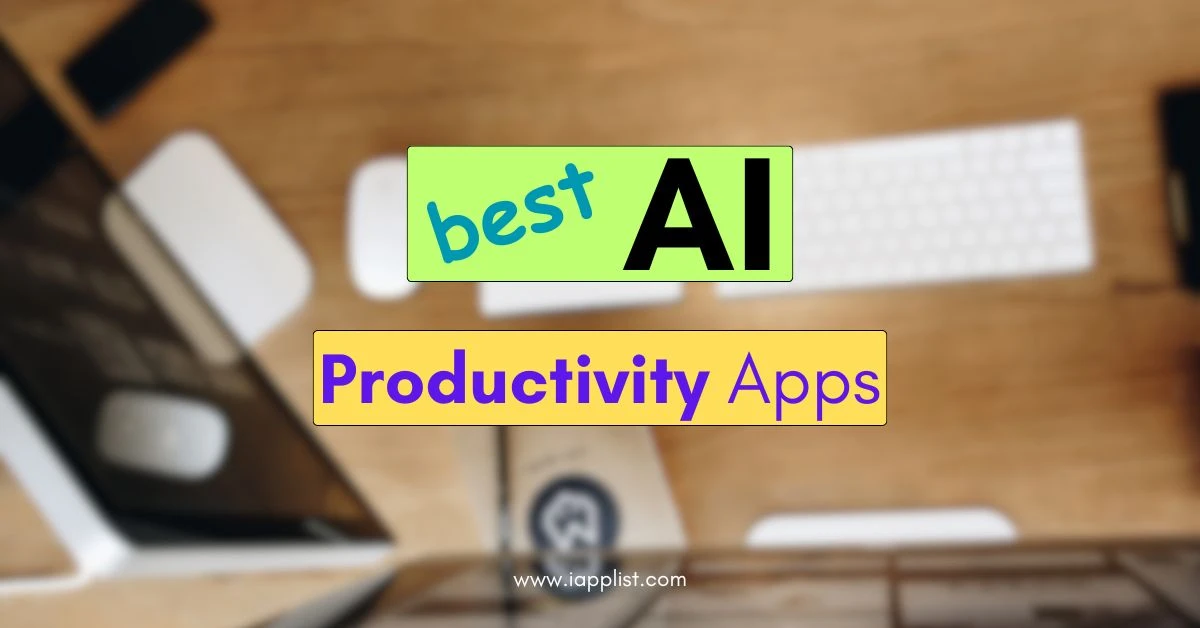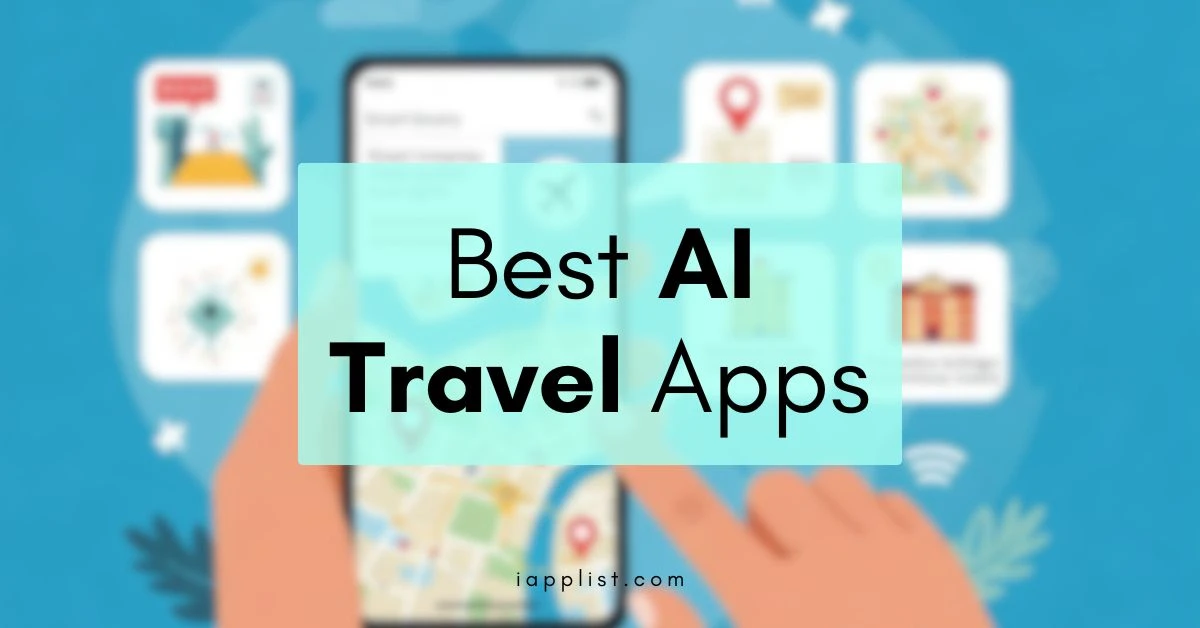25 Best AI Tools for Real Estate Agents Right Now
Real estate is already a lot, you know… like you’re talking to clients, fixing listings, running ads, writing descriptions, chasing leads, the whole thing.
And now there’s AI everywhere.
But the crazy part is… some of these AI tools actually save so much time that you kinda wonder how agents were doing this before.
So I thought, okay, let’s just make one big guide where everything sits in one place.
Not the boring generic stuff — I mean the real tools agents are actually using right now.
Tools that help you write better property descriptions, fix listing photos, make those short videos everyone loves, follow up with leads, create CMAs, all that stuff… without spending your whole day stuck on your laptop.
And yeah, I kept the list super clean — one tool for each use case, no random picks, no “future” tools that don’t even work.
Just real, active apps you can try right away.
Let’s get into it.
1. Lensa AI
Why I Picked It: It makes your listing photos look clean, bright, and basically way more “scroll-stopping” without hiring an editor.
Lensa is kinda that app you open when a property photo looks dull or the lighting is just… off.
You drop the picture in, hit a few AI fixes, and it suddenly looks like something you’d actually want to click on.
The good thing is, you don’t need any editing skills at all.
It just does the heavy lifting — sharpens the details, fixes the shadows, smoothens the messy corners, all that stuff.
And honestly, in real estate, photos are everything.
If the first photo looks boring, people just swipe away.
Lensa helps you avoid that without spending money on a photo editor every single time.
It’s fast, it’s simple, and it kinda always works when you need it.
Also Read: The Best Real Estate Apps
2. Homestyler
Why I Picked It: It’s the easiest way to turn empty rooms into fully-staged spaces without buying a single piece of furniture.
Homestyler is kind of that app you open when a room just looks… plain.
Like, the walls are fine, the space is fine, but buyers can’t imagine anything.
You drop the photo in, pick a style, and the AI stages the whole room in a few seconds.
Sofas, beds, plants, lighting — everything just shows up like magic.
And the cool thing is, it doesn’t look fake or blurry like some other staging apps. This feels more real, more “Pinterest-y,” you know?
Agents use it to show buyers different vibes without spending a dollar on actual staging.
It saves time, saves stress, and honestly makes your listing look way more premium.
Perfect for rentals, small spaces, or those empty new-builds that need a little imagination.
Also Read: 14 Best Rental Apps You Should Try
3. Jasper AI
Why I Picked It: It helps you write clean, catchy property descriptions without staring at a blank screen forever.
Jasper is that tool you open when you have a new listing and your brain is just… tired.
You know the property is great, but finding the right words takes way too long. Jasper basically fixes that.
You give it a few details — number of bedrooms, location, special features — and it turns all that into a description that actually sounds good.
Not robotic, not over the top, just clean and easy to read.
And if you want a specific vibe, like luxury, cozy, modern, family-friendly, whatever, you can switch tones in seconds.
It also helps you fix the little things like grammar, formatting, and repetitive lines.
For agents who list a lot of properties every month, this saves a crazy amount of time.
You just tweak a few lines, hit save, and you’re done.
Also Read: The Best AI Apps for Real estate
4. Canva
Why I Picked It: it helps you make social posts, flyers, and captions that look good without hiring a designer.
Canva is kinda that go-to app when you need something quick but still professional.
You open it, pick a template, change a few photos, add your text, and it’s ready to post.
Real estate agents use it for literally everything: just-listed posts, open house flyers, Instagram Reels covers, market updates, and even those neighborhood tips people love saving.
The AI tools inside Canva make the whole thing even easier.
It can remove backgrounds, fix bad photos, suggest captions, and even rewrite your text when you feel stuck.
And the best part is, you don’t need design skills at all.
Everything is drag-and-drop and super visual.
If you’re trying to stay active on social media without spending your whole day making graphics, Canva honestly keeps you sane.
Also Read: 21 Graphic Design Apps Going Viral Right Now
5. CapCut
Why I Picked It: it makes short real estate videos super easy to edit, even if you have zero video skills.
CapCut is that app you open when you want a quick property video but don’t want to deal with complicated editing.
You drop your clips in, choose a style, and the AI basically builds the whole video for you — cuts, transitions, text, music, everything.
It even has those trendy templates you see on TikTok and Reels, so your listings don’t look boring or outdated.
And if you want to highlight features like the kitchen, backyard, or master bedroom, you can add simple text overlays in seconds.
The AI tools inside CapCut clean up shaky footage, sharpen details, and fix lighting without you touching anything.
For agents who don’t have time to learn all the pro editing stuff, this app just saves the day.
You film the property, upload it, and CapCut does the rest.
6. Follow Up Boss
Why I Picked It: it helps you follow up with leads automatically, so no one slips through the cracks.
Follow Up Boss is kinda that tool agents use when things start getting busy, and you can’t manually reply to everyone.
You drop your leads in — from Zillow, your website, Facebook ads, anywhere — and the AI starts working right away.
It sends quick replies, schedules follow-ups, reminds you who to call, and even ranks your leads so you know who’s actually serious.
The nice part is, it doesn’t feel robotic.
The messages sound normal, the timing feels natural, and you can tweak everything if you want your own style.
And yeah, it also shows you which leads open your messages or click your links, so you’re not guessing anymore.
For agents who handle a lot of inquiries every week, this just keeps the whole system clean and stress-free.
You wake up, check your dashboard, and everything’s already organized.
Also Read: 17 Best Real Estate CRMs Every Agent Should Try
7. ManyChat
Why I Picked It: it helps you set up simple chatbots that answer questions and collect leads even when you’re busy.
ManyChat is that tool you use when people keep messaging you at random hours, asking the same things — price, availability, open house time, address, all that.
Instead of typing replies over and over, you set up a quick chatbot flow, and the AI handles the basics automatically.
It works on Facebook, Instagram, and even your website, which is great because most buyers message you on social first anyway.
You can also capture emails and phone numbers without being pushy — the bot just asks naturally.
And when someone wants something specific, like booking a tour or getting more photos, it instantly notifies you so you can jump in.
It basically keeps conversations warm without you sitting on your phone all day.
Super helpful when you’re juggling multiple listings.
8. HouseCanary
Why I Picked It: it gives you quick market insights and price forecasts without digging through a ton of data.
HouseCanary is that tool you open when you want to know what a home is actually worth right now — not the random guesses you see online.
You type in the address and the AI pulls everything together: recent sales, local trends, property history, neighborhood movement, even price forecasts.
It’s super helpful when a client asks, “What do you think this will sell for?” and you don’t want to spend hours checking comps manually.
The data feels clean and super updated, and the charts make the whole thing easy to understand, even if you’re not a numbers person.
Agents use it before pricing a listing, before making an offer, or just to see how a market is shifting.
It’s fast, accurate, and honestly saves a lot of back-and-forth research time.
Also Read: 17 Best Property Management Apps
9. Cloud CMA
Why I Picked It: it helps you create clean, professional CMA reports without spending your whole evening pulling comps.
Cloud CMA is that tool you open when you need a good-looking report fast.
Instead of jumping between five different websites for comps, photos, and market data, the AI inside Cloud CMA pulls everything together automatically.
You just add the address, pick a template, and the report builds itself — recent sales, active listings, neighborhood stats, price trends, all wrapped in a layout that actually looks sharp.
And yeah, you can customize everything if you want your branding or your own notes added.
The big win is how much time it saves.
Doing a CMA manually takes forever, and this just cuts the whole workload in half.
Agents use it for listing presentations, price discussions, or whenever a seller needs clear numbers in a simple format.
It’s quick, it’s accurate, and you don’t need to be a data expert to use it.
Also Read: 12 Best Home Inspection Software You Should Use
10. Mailchimp
Why I Picked It: it helps you write cleaner real estate emails and send them automatically without overthinking every message.
Mailchimp is that tool you open when you want to stay in touch with buyers and sellers but don’t want to write long emails from scratch every time.
The AI inside Mailchimp suggests subject lines, rewrites your sentences, and even picks the best times to send your emails so more people actually open them.
You can set up simple drip sequences too — like new listing alerts, neighborhood updates, open house reminders, all that stuff — and once it’s running, you barely touch it.
The templates also make your emails look way more professional without you doing any design work.
For agents who want a clean email setup without a huge learning curve, Mailchimp kinda sits in that perfect middle. Easy, automated, and reliable every week.
11. Home AI
Why I Picked It: it basically lets you show buyers how a room could look without touching anything in real life.
Home AI is one of those apps you open when you’re staring at a photo and thinking, “Yeah… this room needs help.”
Maybe the walls look dull, maybe the furniture is old, maybe the space just feels empty.
Instead of stressing about staging or repainting or buying random decor, you just upload the photo and the AI kinda does all the heavy lifting.
It redesigns the whole room in different styles — modern, luxury, farmhouse, cozy — whatever vibe you want.
And the results look clean, not weird or over-edited.
Agents use it a lot when a listing has potential, but the current setup hides it.
It helps buyers imagine things without you spending a dollar.
And honestly, it also makes your social posts look way better because the transformations always catch attention.
Also Read: The Best AI Interior Design Apps
12. Planner 5D
Why I Picked It: it gives you simple 3D floor plans without making you feel like you’re learning architecture.
So here’s the thing… buyers love floor plans, but most agents don’t really have the time or tools to make them.
Planner 5D kinda fixes that whole headache.
You just add the room sizes — nothing fancy — and the app turns it into a clean 3D layout that actually looks believable.
And yeah, you can rotate it, move furniture around, try different layouts, all in a very chill, drag-and-drop way. Nothing overwhelming.
It’s super helpful when a home has an odd layout or when photos don’t show the room flow clearly.
Buyers get a better sense of the space, and you don’t have to spend hours drawing things manually.
It’s just one of those small tools that quietly makes your listing feel way more “put together,” you know?
13. Matterport
Why I Picked It: it lets you create those smooth, walk-through style virtual tours without needing fancy camera skills.
Matterport hits different because it solves a very real problem — not everyone can show up for an in-person tour.
With this app, you just walk around the property with your phone, and the AI stitches everything into a 3D tour that feels clean and super easy to navigate.
No crazy settings, no techy setup… you literally just move through the rooms and let the app handle the rest.
And buyers actually stick around longer when a listing has a virtual tour, especially out-of-state folks.
It helps them understand the layout, the room sizes, the flow — all the stuff regular photos sometimes hide.
Agents use it a lot for rentals, new builds, or homes that are still occupied because it cuts down on unnecessary showings.
It just makes the whole experience smoother for everyone.
14. Zillow
Why I Picked It: it gives quick neighborhood insights that buyers always ask for, but you don’t always have on hand.
Zillow isn’t just searching houses, you know… agents use it way more for all the tiny bits of info buyers keep throwing at you.
Stuff like, “How’s this neighborhood doing?” or “Are prices moving up here?” or “What’s around this area?”
And instead of digging through ten different sites, you just check Zillow’s neighborhood data.
The AI pulls trends, recent sales, school details, local price movement — all those small things that help someone feel confident about a place.
It’s not meant to replace your expertise, but it does save you when you need quick context before a showing or when a client texts you last-minute.
And honestly, buyers trust Zillow because they already use it every day.
When you share insights from here, the conversation just becomes easier and way less “let me get back to you later.”
Also Read: 12 Best Apartment Hunting Apps
15. Looka
Why I Picked It: it helps you build a clean, simple real-estate brand without hiring a designer or overthinking the whole thing.
Looka is one of those apps you try out “just to see,” and then suddenly you’re like… wait, this actually looks good.
You type your name, add a few vibes — modern, minimal, luxury, whatever you’re going for — and the AI throws a bunch of branding ideas at you.
Logos, colors, fonts, even little mockups that make you feel like you already have a full brand kit.
It’s really helpful when you’re just starting out or when your current branding feels kinda outdated.
You don’t have to deal with complicated tools or talk to designers for weeks.
You just play around with options until something feels right.
And yeah, once you lock in your look, you can use those same colors and fonts across your flyers, social posts, signs — everything stays consistent without extra effort.
16. DocuSign
Why I Picked It: it keeps all the contract stuff smooth and quick so you’re not chasing signatures all day.
The funny thing about real estate is… the talking part is easy.
It’s the paperwork that drains you.
DocuSign kind of takes that whole stress off your plate.
You upload the contract, drop the signature boxes where you want them, and send it out — that’s literally it.
Clients can sign from their phone, their laptop, whatever they’re using at the moment. No printing, no scanning.
And the AI tools inside DocuSign help you catch missing fields or spots you forgot to fill, which saves you from awkward follow-ups later.
It’s clean, it’s quick, and honestly, it makes you look a lot more organized to your clients.
When everything goes through smoothly, the whole deal just feels easier for both sides.
17. Zillow Rent Zestimate
Why I Picked It: it gives you a quick, realistic rental estimate when clients want numbers fast and you don’t want to guess.
Rental pricing is tricky because every landlord thinks their place is worth more, and every tenant thinks it’s worth less.
Zillow’s Rent Zestimate kinda sits in the middle and gives you a starting point that feels fair.
You plug in the address, and it pulls recent rentals, local demand, neighborhood trends, and all those tiny details that actually affect price.
It’s not about getting a “perfect” number — it’s about having a solid baseline within seconds.
Super helpful when a landlord texts you like, “What should I list this for?” or when a tenant wants to make sure they’re not overpaying.
And because it updates often, you’re not stuck with outdated info.
It just makes the rent conversation smoother, less awkward, and way more grounded in real data.
Also Read: 17 Best Real Estate Investing Apps You Should Try
18. BiggerPockets Calculators
Why I Picked It: they help you break down investment deals without doing all the math in your head.
When someone asks, “Is this a good investment?” it’s never a simple yes or no.
You need cash flow, cap rate, repairs, rent potential, expenses — all the stuff most people don’t want to calculate manually.
BiggerPockets basically takes all those messy numbers and turns them into something you can actually understand.
You fill in the basics, and the calculators lay everything out: monthly profit, long-term returns, break-even point, all of it.
It’s super handy when you’re working with investors or even just curious clients who want to know if a duplex or rental makes sense.
Instead of scribbling on a notepad or risking a wrong estimate, you get a clean breakdown you can share confidently.
It just makes the whole investment side of real estate feel less stressful and way more straightforward.
Also Read: The Best Investment Apps
19. kvCORE
Why I Picked It: it takes all your leads, follow-ups, and daily tasks and kinda pulls them into one clean system, so you’re not juggling ten apps.
kvCORE feels more like a “home base” than a tool.
You log in and everything’s just… there. New leads, old leads, people who clicked your link last night, folks who visited your website twice, all of it.
And the AI quietly works in the background — sending small follow-up texts, nudging cold leads, reminding you who’s warming up again.
It doesn’t feel pushy or robotic; it’s more like a gentle tap on the shoulder when someone needs attention.
It also helps you keep track of conversations because, honestly, it’s easy to forget who asked what when you’re busy.
You get this clear view of who might be ready to move, who’s still browsing, and who probably needs a little space.
It makes your day feel less scattered and keeps your pipeline moving without you manually babysitting every step.
20. CINC AI
Why I Picked It: it helps you figure out which leads are actually worth your time instead of chasing everyone blindly.
CINC is kinda like having a quiet assistant in the background watching how your leads behave.
It notices who opens your emails, who keeps checking the same listing, who saves properties, who comes back at 2 AM to look again — all those little signals regular CRMs don’t really catch.
Then it ranks them for you, so you know who’s warming up and who’s probably just browsing for fun.
It’s super helpful when your inbox is full and you don’t want to waste time on people who aren’t serious.
The AI score isn’t perfect, but it gives you a pretty solid idea of where to focus.
And when you follow up with someone at the right moment, the conversation always feels smoother.
It’s just less guessing and more timing, which is honestly a big win in real estate.
21. AdCreative.ai
Why I Picked It: it helps you make clean, high-converting ads without staring at a blank Canva screen for an hour.
AdCreative.ai is kinda like a cheat code for agents who run Facebook or Google ads but don’t want to design everything from scratch.
You type in a few details — the property, the offer, maybe a short message — and the AI throws a bunch of ad visuals and copy ideas at you.
Some of them are simple, some look bold, some look modern… but they all feel “ready to use.”
It’s super helpful when you’re in a rush or when your last ad didn’t really perform the way you hoped.
You can test different versions quickly without doing all the design work yourself.
And the captions it generates usually sound clean and straightforward, not robotic.
It just saves you time and gives your ads that little edge, so people actually stop and look instead of scrolling past.
22. SimpleTexting AI
Why I Picked It: it helps you send quick, natural-sounding texts to leads without typing everything out yourself.
SimpleTexting feels like one of those tools you don’t think you need… until your phone starts blowing up and you can’t reply to everyone fast enough.
The AI inside it writes short, simple messages that feel human — not those weird, robotic texts that make people ignore you.
You can tweak the tone, keep it casual, keep it professional, whatever fits your style.
It’s great for small things like confirming showings, sending reminders, sharing a link to a listing, or just checking in with someone who went quiet.
And because people usually open texts way faster than emails, your responses don’t get lost in the chaos.
It keeps conversations moving without you glued to your phone all day.
Just a clean, helpful little tool that makes follow-ups way less stressful.
23. Otter.ai
Why I Picked It: it helps you turn calls, meetings, and walkthroughs into clean notes without trying to remember everything later.
Otter is one of those apps you forget you have… until you actually need it.
You hit record during a client call or while walking through a property, and it quietly transcribes everything in the background.
No rushing to write things down, no “wait, what did they say about the backyard?” moments later.
The transcripts show who said what, and you can highlight the important parts so you’re not digging through long paragraphs.
It’s really useful on busy days when you’re jumping between showings, calls, and follow-ups, and your brain is kinda overloaded.
Instead of panicking about missing details, you just review the notes later and everything’s right there — clear, organized, and easy to skim.
It keeps you sharp without extra effort, which honestly helps way more than you’d think.
24. Copy.ai
Why I Picked It: it helps you write quick website copy and landing-page text without getting stuck on the first sentence.
Copy.ai is kinda like having a writing buddy sitting next to you when your brain feels empty.
You type a few hints — the property, your offer, your service, whatever you’re trying to explain — and it throws different versions at you.
Some sound casual, some sound bold, some sound super clean… and one of them usually clicks.
It’s really helpful when you’re fixing up your “About” page, making a landing page for new leads, or writing those little blurbs that go on your website.
You don’t spend an hour trying to make one paragraph sound decent.
The AI gives you a starting point, and you just tweak it to match your vibe.
It’s simple, it’s fast, and it kinda removes that annoying pressure of writing everything perfectly on the first try.
25. Calendly
Why I Picked It: it makes scheduling super simple so you’re not going back and forth with clients all day.
Calendly is one of those apps that feels small at first, but once you start using it, you wonder how you lived without it.
You set your available times, drop your link to a client, and they just… pick a slot that works for them.
No “Are you free at 4?” or “Let me check and get back to you.” It removes that whole messy back-and-forth.
And the AI part helps by spotting conflicts, sending automatic reminders, and even adjusting for different time zones so nothing gets mixed up.
It’s especially nice when you’re juggling showings, calls, follow-ups, and random last-minute requests.
Everything just stays organized without you doing much.
It keeps your day lighter, your schedule cleaner, and honestly, your mind a lot less cluttered.
My Final Verdict
Real estate already moves fast, and honestly… most days you don’t even get a moment to breathe.
That’s kinda why these AI tools matter.
They don’t magically make you a better agent, but they take away all those tiny tasks that eat your time — writing descriptions, fixing photos, answering the same questions, chasing leads, scheduling showings, all that nonstop stuff.
What I’ve learned is… when you stop doing everything manually, you suddenly have more space for the things that actually move the needle.
Talking to clients. Building relationships. Walking properties. Closing deals. The real work.
So yeah, don’t try to use all 25 tools at once.
Pick two or three that match what you struggle with the most — maybe writing, maybe follow-ups, maybe photos — and start there.
The difference you feel in a week is kinda crazy.
It just makes your whole workflow smoother without making your life more complicated.
FAQs
What AI tools do real estate agents actually use every day?
Most agents use AI for photos, descriptions, lead follow-ups, virtual tours, and social media content because those tasks take the most time.
What is the best AI tool for writing property descriptions fast?
Jasper is the most commonly used because it writes clean, simple descriptions you can edit quickly.
Which AI app is best for virtual staging?
Homestyler is the go-to for most agents because it looks more realistic than cheaper staging apps.
What AI tool helps with real estate lead follow-ups?
Follow Up Boss and kvCORE are the most popular for automated texting, reminders, and keeping conversations warm.
How can I make real estate videos quickly using AI?
Most agents use CapCut because the templates and auto-edits make the videos look polished without any skills.
What’s the best AI tool for creating 3D tours of a property?
Matterport is the top pick — clean tours, simple setup, works well even if you only have a phone.
Which AI tool helps with real estate market analysis?
HouseCanary gives quick price forecasts and neighborhood data without digging through multiple websites.
What’s the easiest AI tool for creating real estate ads?
AdCreative.ai generates ready-to-use visuals and captions for Facebook and Google ads in seconds.
Can AI help me manage all my real estate leads in one place?
Yep — kvCORE is the most popular “all-in-one” platform for tracking leads, follow-ups, and daily tasks.
What AI tools help real estate investors analyze rental deals?
BiggerPockets calculators are the most trusted for cash flow, ROI, cap rate, and long-term profit estimates.






